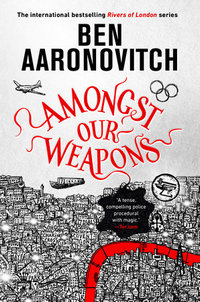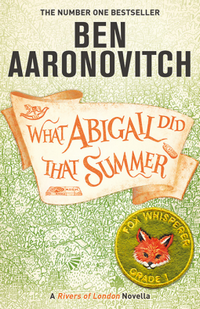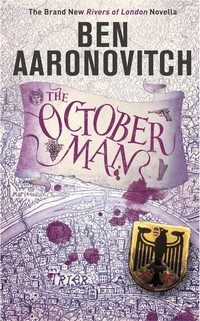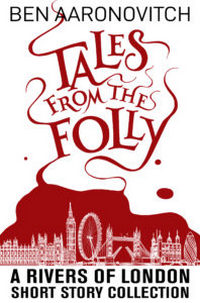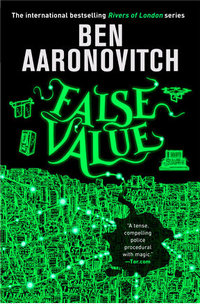by Ben Aaronovitch
DETAILS:
Series: Rivers of London, #9
Publisher: DAW
Publication Date: April 11, 2022
Format: Hardcover
Length: 294 pg.
Read Date: April 12-15


What’s Amongst Our Weapons About?
Peter’s called in for an initial assessment on an odd murder scene, just to make sure that there’s nothing magical about it. He brings along the newest trainee to the Folly’s Course in magical policing, just to familiarize police throughout the country with their methods. On an initial glance, it looks like it’s something that would belong to the Folly, but there’s an odd lack of vestigium—almost a suspicious lack. The method of murder—and the damage to the more technical devices in the area make it clear that this is a magical murder.
So, Peter and his trainee, join Guleed and Stephanopoulos in their investigation. They soon discover that this murder is actually the second in a string—there’s little to tie the two victims together at first glance, except a similar taste in platinum rings. “Taste” is a poor word there, it’s more of an obsessive need to have their ring that invites Gollum comparisons (however they might be discouraged).
This case is likely the most International that the novels have recorded (although no one leaves the country—as helpful as that might have been) and involves history and magical disciplines that Nightingale and Postmartin can only speculate about. In other words—everyone’s in for a pretty steep learning curve before this is all done.
I feel like I’ve spent a lot of words there to say very little, but it’s one of those setups, I’m not sure what else to do.
Everyone Expects…
With a title like that, if the words “Spanish Inquisition,” aren’t on the tip of your tongue, something’s wrong with you. So, you can’t help but look for the Inquisition to show up in the novel—it’s the how it shows up that’s clever and wholly within what you expect for the series.
Aaronovitch doesn’t work Monty Python into this novel quite as thoroughly as he did with the Hitchhiker’s Guide references in False Value—but it’s there. Which is a fun little garnish.
Building Worlds and Bridges
If everything else in this novel was a “bleh” (and it wasn’t), I’d consider this one a win only for the things I’m talking about in this section.
The Rivers of London series has a pretty well-developed world, and there’s a lot of room to play already. But Aaronovitch keeps building it out—and we get a good deal of it here. There’s a whole other side to the world of practitioners in England pre-WWII that we didn’t know about and that Nightingale hasn’t seen a reason to share with Peter before. I loved this new discipline, how it was introduced, and how it ties in with other non-Society of the Wise British practitioners.
It’s very clear that whatever the Magical community looked like pre-WWII, the War devasted it—alliances are shattered, secrecy and nationalism became the order of the day—with a healthy dose of suspicion. Slowly some of the barriers are coming down and Peter has a lot to do with that—his activity alone has helped practitioners in other nations (see: Germany) become aware of the Folly’s current status. Also, Peter’s relationship with Beverly and her family is strengthening and altering the relationship between the Folly, the Demi-monde in general, and The Rivers in particular. We see a big jump on the domestic front with the other discipline and some other things in these pages—but also, there’s a real sign that Peter’s trying to forge a stronger connection between the magical communities of the U.K. and the U.S. I can only hope that this will soon result in Tobias Winter and Peter meeting up.
Also, there’s something that was briefly mentioned in False Value that’s returned to here, but isn’t given all that much attention. I think, ultimately, this is going to be the post-Faceless Man Big Bad, and this slow build-up to it in a series of 2+ is great. I’m including this with the Worldbuilding because it’s pretty clear that whatever this ends up being, Peter (and I bet Nightingale, too) are going to have to reconsider what they know about the world.
Awwwww…
When the book opens, Beverly is close to delivering the twins. In practically every conversation that Peter gets into, someone is asking him about the upcoming birth, the christening (or whatever they end up doing), etc. Seemingly every minor character from the series so far is talking about it.
There are all sorts of goings-on at Beverly’s home to prepare for the birth—and those who aren’t asking Peter questions are chipping in to get things ready.
All hands are on deck—several in unexpected ways—on this front, and for long-time fans, this whole story through the novel is going to be a real pleasure—it’s the emotional heart of the novel and it pays off well. This storyline—especially the last ten pages of the book—is almost enough to tip me from the 4 Stars I was going to give the novel to a 5.
So, what did I think about Amongst Our Weapons?
I’ve tipped my hand already, I realize, but I liked this novel—a lot. This is fairly predictable—it’s the ninth novel in a series that I’m a completist in. I’ve read and listened to the previous eight novels, short stories, and novellas at least once—and have read all the comics one or two times, too. So, it’d take a massive drop in quality for me to be negative about this. It’s not my favorite in the series—but it’s on the upper end of the spectrum.
I do wonder if the main story could’ve been focused on a bit more in the midst of the personal story and all the expansion of the world that’s going on, it sometimes seemed to take a backseat to other things. I think we got a simpler story so that Aaronovitch could do all the extra things without overcrowding the novel. Also, I can’t think of a thing he should’ve cut. If anything, I think it could’ve been improved with another 100-150 pages of material. For example, we’d have been better served to have our favorite FBI Agent, Kim Reynolds, get 2-4 scenes showing some work in the States related to the crimes.
There are some great character moments—including from some unexpected corners. For example, we get some background on one character that I’d simply assumed we’d never learn more about (I think Peter was with me on this point). Like so many things in this novel, that’s a real treat for the fans.
It’s hard to say without knowing where things are going, but it feels to me like the first arc wrapped up in Lies Sleeping and False Value served as a chance for the characters and readers to catch their breath after it, and Amongst our Weapons is setting things up for the next arc. Given all the things that are set up? It’s going to make taking down the Faceless Man seem easy. I can’t wait.
Obviously, I recommend this to those who’ve read this series—although I probably don’t need to. If you’ve read this far and haven’t read the series—I encourage you to do so. I don’t know that this is where I’d jump on—it’s not a bad place, per se, but it’s not the best. Maybe try False Value first—however, going back to the beginning would be best.

This post contains an affiliate link. If you purchase from it, I will get a small commission at no additional cost to you. As always, opinions are my own.

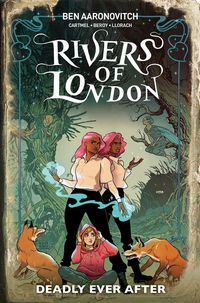 Rivers of London: Deadly Ever After
Rivers of London: Deadly Ever After

![]()


